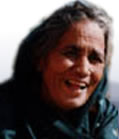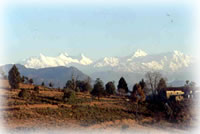 |
 |
||
 |
|||
|
RELATED THEMES culture and customs festivals tourism OTHER LOCAL THEMES BACKGROUND |
spiritual beliefs
The testimonies abound in descriptions of local deities, important to the immediate community. Yet it's clear that these mountains are significant to many more people than those who live here. This Himalayan region has many of the most sacred pilgrimage sites in the country, and is the source of the holiest of Indian rivers, the Ganges. One man (India 8) has much to say on the spiritual nature of the land and people: "And you know that we who live here are religious people. The great poet Kalidas has said that the greatest mountain in the world is situated here and the people who live in this area are the embodiment of the deities themselves. Some people accept a deity as their personal god; sometimes these become village deities and are worshipped by the villagers. This hill area is the land of the lord of lords, that is, Lord Shiva's Himalaya." The majority of the narrators are Hindu, but there are also Buddhists and Muslims. Some narrators discuss changes in worship, for example, a gradual shift from animal sacrifice to less costly forms of offering. Some describe beliefs that they call "superstitious" rather than spiritual, though the distinction is clearly a difficult one: more than one narrator implies that people in the plains tend to regard the beliefs and practices of mountain people as superstitious. Opinion is divided over whether spiritual beliefs remain central to people's lives: several express similar views to India 14: "The people earlier had lots of faith in the deity but not any longer. Today they are all earning their living outside and have become very proud of this fact." Another (India 19) says that the decline in spiritual values and neglect of the gods is responsible for the worsening climate and reduced rainfall: "We do not have faith in our deities any longer, nor do we worship them. We are going astray." The importance of the region's sacred sites means it has long been a centre of spiritual tourism, but the development of the road network and the tourist industry has brought pilgrims in far greater numbers and visitors whose motivation, some would argue, is not as holy as those of the past. Some feel the sanctity of the sites is being "defiled" by these modern developments. One (India 9) suggests: "Meat shops and wine drinking should be strictly prohibited in the areas of religious importance because it has a bad effect on the dignity of the shrines and on the peaceful atmosphere around them." Road building sometimes threatens sacred sites: "This region of Saunla is a forest associated with our culture, it is the region of the Thakur (principal deity) of this land. Neither should the road go through here nor should the forest be cut," protests India 3. quotes about spiritual beliefs"If we had a drought people prayed to God for rains. We do so even today. It always rained when we prayed. Call it coincidence or faith, but people had a very strong belief in it. There was a terrible drought [25 years ago] and people had gone to worship Devi Surkanda (the village deity). They had taken a vow that the temple would be [repaired]. if the Devi gave water. [At] about midnight it started thundering and rained heavily. - even the underground tank was full. The people were able to repair the temple very well and returned home. You can see, therefore, that our religious beliefs are more for collective well being than individual gain." "Our original religion is Buddhism but we follow both Hinduism and Buddhism. We worship Lord Rama and Shiva equally, as we do the Dalai Lama." "Whatever it be, religion does mean good behaviour. Religion teaches this first and foremost. But today, in the present context, religion has been used to mislead people to fight and indulge in sectarianism and fanaticism." "The only difference between Hindus and us is that we read Namaz (prayers) but they do not. We do not slaughter goats, even for Bakrid (Muslim festival), because we are poor and can't spare 2,500 or 3,000 rupees to buy a goat. So we make less expensive delicacies like halwa and kheer (sweet dishes). We attend [the Hindus'] weddings and they attend ours. They invite us for Diwali (Hindu festival of lights) and other religious festivals. We eat food cooked by them, but they take raw rations from us and cook it themselves. We do not eat mutton there since they eat jhatka mutton and we take halal meat (different methods of slaughter)." "During September Lord Yasanga comes and dances. He belongs to Himachal Pradesh. This god dances to the beat of a drum. A man dances and we believe that the god has entered into him. He carries a brass pot in his hand and dances. This pot is the symbol of the god. All the people of the village make a line behind him and dance. They also hold hands and dance." |
|
 These interviews are full of references to spiritual beliefs, and are particularly characterised by people's sense of the sacredness of their mountain surroundings. Many prominent peaks and geographical features, as well as the streams, trees, plants and seeds that sustain communities, have been imbued with religious significance. This also confers protection and ensures continuity of these natural resources.
These interviews are full of references to spiritual beliefs, and are particularly characterised by people's sense of the sacredness of their mountain surroundings. Many prominent peaks and geographical features, as well as the streams, trees, plants and seeds that sustain communities, have been imbued with religious significance. This also confers protection and ensures continuity of these natural resources.